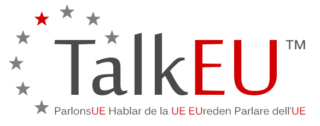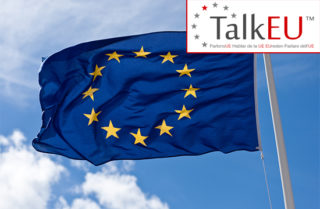TalkEU Hablar de la UE
EUreden Parlare dell’UE
The EU comprises of 500 million people spread over 4.3 million square kilometres. How do they communicate? Here we look at the five biggest official languages in the EU (by number of speakers)
#1. English – No Surprises Here Folks

English is everywhere: It is the most widespread language in the world. Travel to virtually any country in the world and you will find English. In fact, English was probably used to get you there; as English is the language of the skies. All pilots are required to identify themselves using English (and standard aviation phraseology).
English initially spread with the British Empire, establishing an English-speaking elite around the globe. The influence of the English language has remained, re-enforced by the technological and cultural advances of English-speaking countries like the United States of America. English remains the language of business and higher education, with leading publications around the world written in English. English is also the biggest language on the internet. We think. It could be cat memes.
Interestingly, there is no official central English language governing body. Unofficially however, some people consider the Oxford English Dictionary to be an authority. The lack of standardisation has allowed a very interesting interplay between local cultures and the English language, giving rise to dialects like Singlish (Singaporean English). The same word can have very different meanings, even in closely related ‘dialects’. Take the word rubber. In the United Kingdom, it is an item of stationery. In the US a rubber has more entertaining uses.
#2. German – 63 letters and counting…

German is usually ranked as the 10th largest language in the world. Most native speakers of German are in Germany, which is actually unusual for a popular language. For example the USA has roughly four times as many English native speakers as the United Kingdom. If we were going by native speakers, German would in fact be the largest language in the EU.
German is famous for “compound words” and occasionally harsh, terrifying pronunciations. A Krankenwagen doesn’t sound quite as friendly as an ambulance. Compounding allows long, and admittedly somewhat niche, words like Rechtsschutzversicherungsgesellschaften (insurance companies providing legal protection).
That said, there are some particularly useful German words. We all know a Backpfeifengesicht – a face badly in need of a fist. We all feel Schadenfreude – pleasure derived from another person’s misfortune. Admit it. We know you do.
#3. French – Don’t Mix Business with Pleasure

What doesn’t sound more romantic in French? The classic “Voulez-vous coucher avec moi?” Try saying that in German. Or English for that matter. Not quite the same.
French is almost as widely spoken as English, with significant usage in Western and Sub-Saharan Africa. French has also influenced the English language, with 30-50% of English words believed to have French origins.
Romance aside, French has many business applications. Classically, French is considered the language of diplomacy. It is an official working language of many international organisations, such as the United Nations or the European Court of Human Rights. It is very important to understand the cultural significance of any remarks.
French is also the working language of the International Bureau of Weights and Measures. This is the organisation responsible for maintaining key measures such as the International Co-Ordinated Universal Time Constant (UTC) or the International Prototype Kilogram. Without this we would not be able to sustain the world as we know it.
#4. Italian – “Are you not entertained?”

When you think of Italy, you might think of Ancient Rome, Gladiators and Cesar. Or perhaps you think of Michelangelo’s David, or Da Vinci’s Mona Lisa. Therefore, you would think that Italy and the Italian language have been around for centuries. And you would be wrong.
Technically the Republic of Italy was unified and the language standardised around 150 years ago. At the start, only around 2% of the population could speak the standardised Italian language, with most people speaking one of the 20 local regional languages.
Today, around 90% of the population use the standardised language, with a minority speaking only a regional language. The regional languages however are still very strong, with Neapolitan and Tuscan being among largest. The standardised Italian language only has 21 letters in its alphabet – missing J, K, W, X and Y. Any “Italian” words containing these letters are usually loan words from other languages.
#5. Spanish – Half the world is not enough…

Spanish is an Indo-European Language which has been heavily influenced by Arabic, with around 8% of Spanish words being Arabic in origin. Spanish is commonly listed as the second-largest language in the world (by number of native speakers) after Mandarin. It’s basically the most common language in the Western Hemisphere of the Earth.
Most Spanish speakers are found outside Spain, with Mexico being the largest Spanish-speaking country. Spanish is the lingua franca, if not the official language, of most countries in South America.
Spanish is projected to become the second language of the United States of America by around 2020. Interestingly, the British Council have listed Spanish as the most important language in the UK’s future. Spanish is however, only 5th on our list of Top 5 Biggest Languages in the EU.
TalkEU

This article is part of the TalkEU series. TalkEU will answer a wide range of questions, from what language the Brexit negotiations will be in, to whether UK citizens may need to translate their passport to apply for European visas.
We will be posting a new TalkEU article each week, so don’t forget to keep checking our blog for more information and answers.

